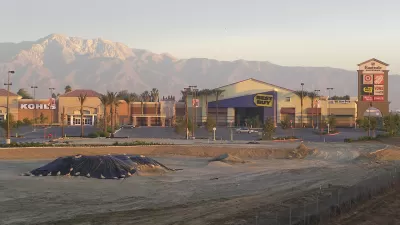Big-box retailers' new tactic to slash their taxes is the latest example of why cities are better off saying no to the boxes and cultivating Main Streets instead.

In February, the library in Marquette, Mich., announced that it was cutting its hours.
It wasn’t that its Sunday programming was any less popular, or that it had gotten the short end of the stick in next year’s budget planning. Instead, thanks to a new method that big-box stores are using to game the tax system, Marquette Township owed a $755,828.71 tax refund to the home improvement chain Lowe’s. Essential services like the library, the school district, and the fire department were on the hook to pay for it.
The Peter White Public Library would now be closed on Sundays.
Marquette has been hit hard by a tactic that the country’s biggest retailers are using to slash their property taxes. Known as the “dark store” method, it exemplifies the systematic way that these chains extract money from local governments. It’s also the latest example of the way that, even as local governments across the country continue to bend over backwards to attract and accommodate big-box development, these stores are consistently a terrible deal for the towns and cities where they locate.
Read the rest of the article at the link below.
FULL STORY: For Cities, Big-Box Stores Are Becoming Even More of a Terrible Deal

Planetizen Federal Action Tracker
A weekly monitor of how Trump’s orders and actions are impacting planners and planning in America.

Chicago’s Ghost Rails
Just beneath the surface of the modern city lie the remnants of its expansive early 20th-century streetcar system.

San Antonio and Austin are Fusing Into one Massive Megaregion
The region spanning the two central Texas cities is growing fast, posing challenges for local infrastructure and water supplies.

Since Zion's Shuttles Went Electric “The Smog is Gone”
Visitors to Zion National Park can enjoy the canyon via the nation’s first fully electric park shuttle system.

Trump Distributing DOT Safety Funds at 1/10 Rate of Biden
Funds for Safe Streets and other transportation safety and equity programs are being held up by administrative reviews and conflicts with the Trump administration’s priorities.

German Cities Subsidize Taxis for Women Amid Wave of Violence
Free or low-cost taxi rides can help women navigate cities more safely, but critics say the programs don't address the root causes of violence against women.
Urban Design for Planners 1: Software Tools
This six-course series explores essential urban design concepts using open source software and equips planners with the tools they need to participate fully in the urban design process.
Planning for Universal Design
Learn the tools for implementing Universal Design in planning regulations.
planning NEXT
Appalachian Highlands Housing Partners
Mpact (founded as Rail~Volution)
City of Camden Redevelopment Agency
City of Astoria
City of Portland
City of Laramie





























